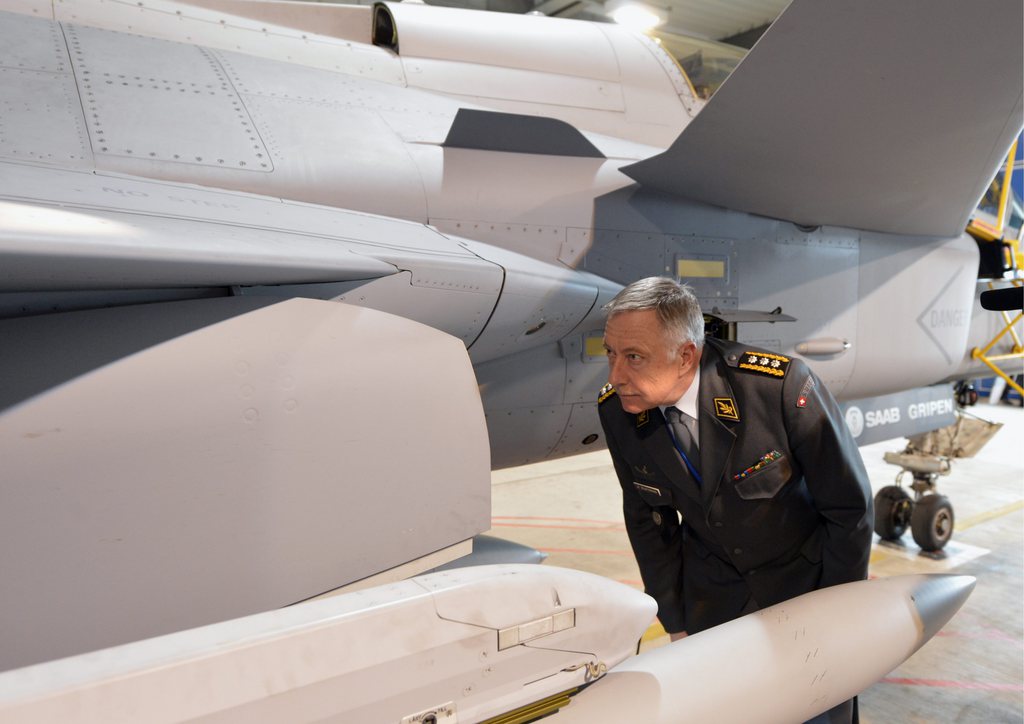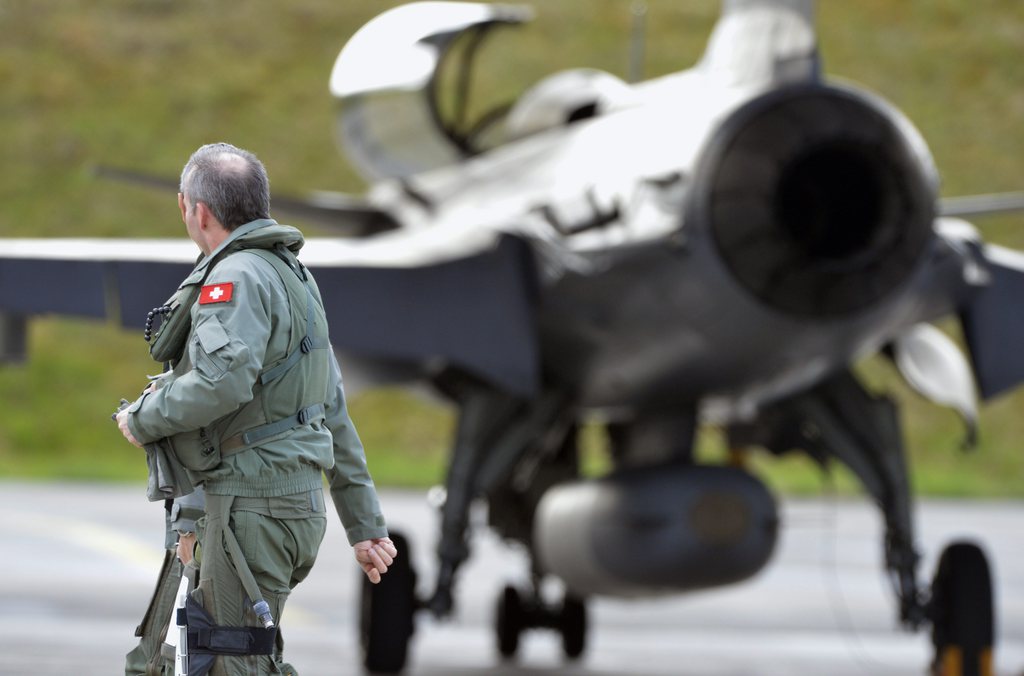
Should new jets or neighbours defend Swiss skies?

The hijacking of an Ethiopian airliner to Geneva two months ago highlighted shortcomings in Switzerland’s capability to protect its airspace. The incident came ahead of a nationwide vote on the planned purchase of new fighter aircraft.
In the early hours of February 16 an Ethiopian Airlines passenger plane bound for Rome was hijacked. Seeking asylum in Switzerland, the co-pilot flew the plane further northwest.
The airliner was intercepted by Italian Eurofighter jets, then handed over to the French Air Force before it landed at Geneva airport. The Swiss Air Force did not intervene, because it is only operational during office hours.
The drama ended without bloodshed but made the Swiss a laughing stock around the world.
Denis Froidevaux, president of the Association of Swiss Military Officers, is not in the mood for jokes. “The situation in Geneva could have gone terribly wrong. I hope politicians have learnt their lesson,” he told listeners of Swiss public radio, RTS.
For his part, Defence Minister Ueli Maurer has blamed a lack of finances for the inability to guarantee a round-the-clock intervention of Swiss fighter jets to protect the airspace. He said plans were underway to set up comprehensive coverage in cases of an emergency following a decision by parliament in 2010 to attribute more financial means to the Air Force.
The system is to be operational from 2020 as time is needed to recruit and train an additional 100 military personnel, including fighter pilots and ground staff.
Maurer added that time and money – CHF30 million ($33.8 million) annually – are not the only things needed. He called for the purchase of new Swedish Gripen fighter jets – the issue of a nationwide vote on May 18.
“They will help ensure a greater ability of the Air Force to intervene in the long run,” he said.
The 22 JAS-39 aircraft, made by the Swedish Saab aerospace company, are to replace the fleet of F-5 Tiger jets which will be decommissioned by 2017 after more than 30 years.

More
Air Force working hours to be discussed
Policing duty
During a visit to the Payerne air base at the end of last month Maurer took his message up a notch.
“Our airspace will become very vulnerable from 2030 at the latest if we do not acquire new fighter jets,” he told journalists.
Opponents of the Gripen purchase have refused to follow Maurer. They say the fleet of 32 F/A-18 jets is more than sufficient to police Swiss airspace.
It is virtually the only task the Air Force has – and will have – according to campaigners against the Gripen purchase, as there is hardly any risk that Switzerland will be attacked by a foreign enemy force or that Swiss fighter jets will attack targets outside the country.
“We do not need new fighter jets for round-the-clock air protection. The existing fleet is enough by far,” said Daniel Vischer of the Green Party.
Campaigners on the political left say Switzerland’s F/A-18 fleet is larger than any other of a country of comparable size.
“Only recently the Air Force made a state-of-the-art technological update for hundreds of millions of Swiss francs,” the anti-Gripen committee said.
The following video shows first the F/A-18 and then the Gripen flying over the Bernese Alps during an air show attended by Defence Minister Ueli Maurer.
Lifespan
For Alexandre Vautravers, editor-in-chief of the Revue militaire suisse and professor at the Geneva-based Webster University, it is not simply a question of whether the new jets are necessary.
“At least on paper it seems we have sufficient resources. But the problem for the Air Force is how long it can stay in a state of alert and keep up its availability,” he said, adding that the current Swiss Air Force couldn’t provide a round-the-clock emergency service for more than three weeks.
“With 32 fighter jets, our availability begins to melt down like snow in the sun.”
The reason being that the fleet of aircraft is in use more frequently, which in turn requires more maintenance for the planes.
The Swiss Air Force distinguishes between two types of air policing missions:
“Live missions” are routine sorties to visually inspect foreign aircraft crossing Swiss airspace under diplomatic protocol. As a rule, scheduled flights by international airlines are not inspected, except in special cases.
“Hot missions” are emergency interventions when an aircraft has failed to establish radio contact with ground control or when planes enter off-limit airspace or leave the correct cruising level.
The Swiss Air Force flew ten “hot missions” in 2012 and 14 the previous year. It recorded 207 “live missions” in 2012 and 350 in 2011.
Controversial choice
The Gripen option was a political compromise and it has remained controversial. Even among advocates of a fighter jet purchase there were many who would have preferred the more powerful French Rafale by Dassault or the Eurofighter by the EADS consortium.
Parliament last year voted for the Swedish aircraft in line with recommendations by the government – not least because the Gripen are less costly than the rival offers.
Defence experts agree that the Gripen are perfectly suitable of carrying out air policing duties, a technically simple task.
Jean-Dominique Merchet, a French journalist specialising in defence matters, says speed is the only crucial requisite for inspection missions.
“The Gripen as well as the Eurofighter or the Rafale are more than fast enough,” he says.
An opinion shared by Vautravers, who adds that the Gripen can be used for much more than just air policing. It is a solid foundation for the next three or four decades, he says.
“What counts now is the precision weaponry and the electronic equipment. It is safe to say that even a relatively modest aircraft like Gripen can be updated technically over the years.”
Cooperation
A crucial element of Switzerland’s airspace protection is the cooperation with its neighbours: France, Germany, Austria and Italy. It allows pilots of those air forces to fly into Swiss airspace.
This was also the case of the French Mirage jets which escorted the hijacked Ethiopian Airlines Boeing to Geneva airport, which is just a few kilometres from the border with France.
There is also established cooperation with the air forces of France, Italy and Austria during major international events in Switzerland, notably the annual meeting of the World Economic Forum in Davos.
But foreign aircraft can only escort planes; they have no right to shoot down an aircraft over Swiss territory.
Neutrality
Given the past experience, why not go all the way and leave the protection of Swiss airspace to a neighbouring air force?
“This would certainly be possible from a technical point of view, but it would come at a price,” says Merchet.
Six member states of the European Union have given up policing their airspace with their own air force having negotiated an accord with partner countries.
A case in point is Slovenia, whose skies are patrolled by the Italian air force. But this is not possible for Switzerland for political reasons.
“Switzerland is neither a member of the EU nor of the North Atlantic Treaty Organization (NATO). It must provide its own air protection under international law,” says Vautravers.
He doubts whether there will ever be a political consensus in neutral Switzerland to delegate the protection of its airspace.
Asking a neighbouring state to step in carries certain risks. “You would literally give away sovereignty and have no means of knowing what that neighbouring air force is doing.”
(Adapted from French by Urs Geiser)

In compliance with the JTI standards
More: SWI swissinfo.ch certified by the Journalism Trust Initiative






























You can find an overview of ongoing debates with our journalists here . Please join us!
If you want to start a conversation about a topic raised in this article or want to report factual errors, email us at english@swissinfo.ch.